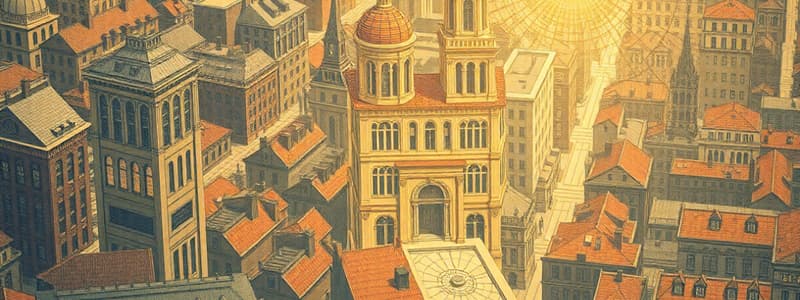Podcast
Questions and Answers
Which theory suggests that cities grow outwards in concentric circles?
Which theory suggests that cities grow outwards in concentric circles?
- Sector Theory
- Concentric Zone Theory (correct)
- Multiple Nuclei Theory
- Urban Ecology Theory
The Sector Theory states that cities grow around multiple centers with unique characteristics.
The Sector Theory states that cities grow around multiple centers with unique characteristics.
False (B)
What are the three main theories of city growth mentioned?
What are the three main theories of city growth mentioned?
Concentric Zone Theory, Sector Theory, Multiple Nuclei Theory
Economic activities like __________, commerce, and tourism drive urban growth.
Economic activities like __________, commerce, and tourism drive urban growth.
Match the following theories with their descriptions:
Match the following theories with their descriptions:
Which factor is NOT identified as a contributing force on city growth?
Which factor is NOT identified as a contributing force on city growth?
Migration is a social factor influencing urban development patterns.
Migration is a social factor influencing urban development patterns.
In urban planning, what role do political policies play in city growth?
In urban planning, what role do political policies play in city growth?
The __________ Theory argues that cities develop around multiple centers, each with unique characteristics.
The __________ Theory argues that cities develop around multiple centers, each with unique characteristics.
Match the factor with its impact on urban growth:
Match the factor with its impact on urban growth:
What do growth poles primarily do in a region?
What do growth poles primarily do in a region?
The Central Place Theory indicates that smaller towns offer a wider range of goods and services than larger cities.
The Central Place Theory indicates that smaller towns offer a wider range of goods and services than larger cities.
What are the three stages of Rostow's Stages of Growth?
What are the three stages of Rostow's Stages of Growth?
During the _____ stage of Structural Change Theory, an economy is primarily based on agriculture.
During the _____ stage of Structural Change Theory, an economy is primarily based on agriculture.
Match the economic stages with their characteristics:
Match the economic stages with their characteristics:
What drives urban growth in the Intermediate stage of Structural Change Theory?
What drives urban growth in the Intermediate stage of Structural Change Theory?
Growth poles can lead to regional inequality by attracting all investment to specific areas.
Growth poles can lead to regional inequality by attracting all investment to specific areas.
In the Central Place Theory, what competition exists between central places?
In the Central Place Theory, what competition exists between central places?
The _____ stage of Rostow's Growth model involves significant industrialization and urbanization.
The _____ stage of Rostow's Growth model involves significant industrialization and urbanization.
Which theory describes the hierarchy of places based on the services they offer?
Which theory describes the hierarchy of places based on the services they offer?
What characterizes the Age of High Mass Consumption?
What characterizes the Age of High Mass Consumption?
Urban planning theories aim to promote unequal distribution of resources and services.
Urban planning theories aim to promote unequal distribution of resources and services.
Name one challenge in implementing urban planning theories.
Name one challenge in implementing urban planning theories.
The Drive to Maturity stage involves the diversification of the economy and __________.
The Drive to Maturity stage involves the diversification of the economy and __________.
Match the following challenges in implementing urban planning theories with their descriptions:
Match the following challenges in implementing urban planning theories with their descriptions:
Which of the following is NOT a factor considered in sustainable urban development?
Which of the following is NOT a factor considered in sustainable urban development?
Theories of urban planning are irrelevant for shaping the future of cities.
Theories of urban planning are irrelevant for shaping the future of cities.
What do urban planning theories help policymakers make?
What do urban planning theories help policymakers make?
Urban planning theories emphasize __________ development by balancing social, economic, and environmental factors.
Urban planning theories emphasize __________ development by balancing social, economic, and environmental factors.
Which of the following is a characteristic of the Drive to Maturity stage?
Which of the following is a characteristic of the Drive to Maturity stage?
Flashcards are hidden until you start studying
Study Notes
Theories of City Growth
- Concentric Zone Theory: Suggests cities grow outwards in concentric circles with different land uses in each zone, with the Central Business District (CBD) in the center.
- Sector Theory: Cities grow in sectors with certain activities concentrated in specific directions, typically influenced by transportation routes.
- Multiple Nuclei Theory: Cities develop around multiple centers, each with its own unique characteristics and specialized functions.
Contributing Forces on City Growth
- Economic Factors: Industrial activity, commerce, and tourism drive urban growth by attracting people and resources.
- Social Factors: Migration, population growth, and changing lifestyles influence urban development patterns.
- Political Factors: Political policies, infrastructure investments, and land-use regulations shape urban growth significantly.
Growth Pole Theory
- Initiating Growth: Focuses on "growth poles" - key industries or locations that drive economic development in a region.
- Regional Development: Growth poles attract investment, create jobs, and stimulate economic activity in surrounding areas, promoting regional growth.
Central Place Theory
- Market Areas: Explains the spatial distribution of cities and towns based on their roles as centers for providing goods and services.
- Spatial Competition: Central places compete for customers and resources, leading to spatial patterns of urban development.
- Hierarchy of Places: Central places are arranged in a hierarchy, with larger cities offering a wider range of goods and services than smaller towns.
Structural Change Theory
- Early Stage: Agriculture-based economy with limited urban growth.
- Intermediate Stage: Industrialization and manufacturing lead to rapid urban growth.
- Advanced Stage: Service-based economy and technological innovation support sustained urban growth, but patterns may shift.
Rostow's Stages of Growth
- Traditional Society: Subsistence agriculture-based economy with limited technology.
- Preconditions for Take-off: Development of infrastructure, institutions, and human capital, setting the stage for economic growth.
- Take-off: Rapid economic growth, industrialization, and urbanization.
- Drive to Maturity: Diversification of the economy, technological advancement, and spread of economic growth.
- Age of High Mass Consumption: High levels of consumer spending, a high standard of living, and a focus on services and technology.
Implications of Urban Planning Theories
- Informed Decisions: Theories help policymakers and planners make informed decisions about land use, transportation, and infrastructure development.
- Sustainable Development: Importance of managing urban growth sustainably, considering environmental, social, and economic factors.
- Equitable Development: Promotes the equitable distribution of resources, services, and opportunities in cities.
Challenges in Implementing Urban Planning Theories
- Political Constraints: Political pressures, vested interests, and conflicting priorities can hinder the implementation of urban planning policies.
- Economic Constraints: Limited financial resources, budget cuts, and economic downturns can restrict urban development projects.
- Social Constraints: Social inequality, community resistance, and differing perspectives can create challenges in implementing urban plans.
Conclusion and Key Takeaways
- Urban planning theories provide a valuable framework for understanding and shaping the future of cities.
- Applying these principles and addressing challenges can create more sustainable, equitable, and vibrant urban environments.
Studying That Suits You
Use AI to generate personalized quizzes and flashcards to suit your learning preferences.




